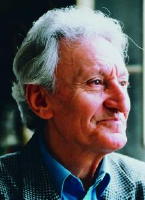- Yordan Radichkov
Infobox Writer
name = Yordan Radichkov

imagesize =299
caption = Yordan Radichkov
birthdate = birth date|1929|10|24|
birthplace = Kalimanitza, Montana region,Bulgaria
deathdate = death date and age|2004|1|21|1929|10|24
deathplace =Sofia ,Bulgaria
occupation =writer ,playwright Yordan Radichkov ( _bg. Йордан Радичков) (
October 24 ,1929 -January 21 ,2004 ) was a famousBulgaria n writer and playwright. Some literary critics state [http://books.guardian.co.uk/news/articles/0,6109,1135860,00.html] that he is the most significant figure in Bulgarian literature in the last third of the 20th century. Some literary critics have referred [http://books.guardian.co.uk/news/articles/0,6109,1135860,00.html] to him as the BulgarianKafka orGogol .Early life
Born in a poor family in the village of Kalimanitza, Montana region, he began his career as
Vratsa regional correspondent for the "Narodna mladezh" (National Youth) newspaper and later on took over editorial duties.Writing career
Radichkov's literary career began as he started writing short stories for the "Vecherni novini" (Evening News) newspaper and his early collections caught the attention of readers and critics alike with their lyricism and directness. In 1959, he published his first full-length book, "Sarczeto bie za horata" (The Heart Beats for the People), followed by "Prosti rutse" (Simple Hands, 1961) and "Oburnato nebe" (A Sky Turned Upside Down, 1962), all written in the socialist-realist official style.
This romantic style was gradually replaced by a style of parody and the grotesque, with an increase in folkloristic elements, including folk fantasy and humor. Radichkov began parodying styles and reality: his works deprived objects of their natural dimensions and took them out of context; he combined disparate genres and transformed reality into a comic theater, defusing absurd aspects of life by means of laughter. A mixture of the fantastic and the real, Radichkov's works combined images of industrial civilisation with those of a remote mythical past, and were sometimes defined as a Balkan
magic realism . His parodic style was initially met with animosity from the ruling Communist party (he was often accused of primitivism, escapism and dark agnosticism). Over the years Radichkov has gained popularity and recognition in Bulgaria and the international community, including a Nobel Prize nomination.Radichkov's 1966 script for the film "Goreshto pladne" (Hot Noon) was a story about humanity's efforts to save a trapped boy from drowning in a surging river and was a huge success for the writer. "Baruten bukvar" (Gunpowder Primer), his 1969 novel was the first in his homeland to talk about Socialism through a powerful blend of profanity, fantasy and folkloric wisdom rather than simple idealization. The award-winning "Posledno liato" (The Last Summer, 1974) is a parable of a man trying desperately to stay faithful to his own identity in a dynamically changing world.
He also wrote a number of internationally acclaimed children's books, often illustrated with his own abstract drawings. In 1996 "Malki zhabeshki istorii" (Little Frogs' Stories) won the
Hans Christian Andersen award for children's literature.Awards and public recognition
Radichkov has been awarded a wide number of awards for literature, theatre, and film, both is his homeland and abroad, among them the Order of Stara Planina (the highest order of
Bulgaria , 2003), the prestigious Italian prizeGrinzane Cavour (1984) and the prize of theInternational Academy of the Arts in Paris (1993). A founding member, and first president (1984-1991) of theBulgarian-Swedish Association for Friendship , he received the Swedish nationalPolar Star Award (1988).He was a prominent figure in
Bulgaria 's public life - a member of the Union of Bulgarian Writers since 1962, he was elected MP for theBulgarian Socialist Party in 2001, but quickly resigned in disagreement and spent the last years of his life increasingly withdrawn from politics.Radichkov's works have been translated in more than 30 languages and in 2001 he was nominated for the
Nobel prize for literature .Honour
Radichkov Peak onLivingston Island in theSouth Shetland Islands ,Antarctica is named after Yordan Radichkov.
Wikimedia Foundation. 2010.
